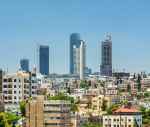You are here
Elections that chart Iran’s way
Feb 24,2016 - Last updated at Feb 24,2016
Tomorrow’s elections to Iran’s parliament and Assembly of Experts have been hard fought by reformists and moderates, on one side, and conservatives and hardliners, on the other, although campaigning has been restricted to a week.
Both sides realise that the future shape of the Iranian Islamic Republic could depend on the outcomes of these two contests — even though the powerful Guardian Council sought to fashion the results well before election day.
The Guardian Council, which vets legislation and candidates for election, disqualified well-known reformist candidates from standing for both.
The most publicised of these exclusions from the contest for the Assembly of Experts involved Hassan Khomeini, grandson of Ayatollah Ruhollah Khomeini, the founder of the Islamic republic.
Since Hassan Khomeini was not invited to take the exam required for nomination to the Assembly of Experts, he was excluded on a technicality.
He is the son of the late Ahmad Khomeini, the ayatollah’s son, a critic of Supreme Guide Ayatollah Ali Khamenei.
The Guardian Council, which is loyal to the Supreme Guide, sees its job as preservation of the system and, presumably, the status quo which the moderate/reformist camp seeks to change.
Its members are regarded by the Guardian Council as “enemies” of vilayet-e faqih, rule by the Islamic jurist, i.e., the supreme guide.
Hassan Khomeini has his grandfather to blame for the battle between reformist/moderates and conservative/hardliners.
The ayatollah skilfully played off one side against the other to ensure that his policies predominated.
His successor, Khamenei, has followed his example but leans towards the conservative/hardline side.
Both elections are important to him.
The next parliament will determine how the country emerges from the punitive sanctions regime imposed by the US and the international community until Iran signed a deal to dismantle its nuclear programme, which the West argued would result in the manufacture of nuclear weapons.
The deal, opposed by many in the conservative/hardline camp, would never have been agreed without Khamenei’s support, but now he has to “give” that camp a political pay-off to make up for its defeat over the nuclear agreement.
The new 88-member Assembly of Experts is likely select the next supreme guide during its eight-year term.
Khamenei, 76 and ailing, wants to ensure he approves the choices and his successor will continue his policies.
It had been hoped that Hassan Khomeini would bestow the “baraka” or “blessing” conferred by a descendant of the ayatollah on the moderate/reformist camp led by President Hassan Rouhani, who is supported by former presidents Akbar Hashemi Rafsanjani, a pragmatist, and Mohammed Khatami, a genuine reformist who failed to secure the change he promised due to hardline opposition.
After Khatami’s presidency (1997-2005), conservatives dominated Iranian politics until Rouhani won the presidency in 2013. But they have continued to hold sway over parliament and other institutions. They are determined to hang on to power.
More than 12,000 candidates put their names forward for the parliamentary elections, but more than half were disqualified, leaving 6,200 candidates, including 586 women, for seats in the 290-member majlis.
The moderate/reformist camp has rallied behind the candidates allowed to stand, formed joint lists in the capital and other key cities, and pooled resources in a bid to defeat influential hardliners.
The conservative/hardline camp has been also organised. The parliamentary polls may not impact Iran’s foreign policy, but are certain to affect next year’s presidential election, which Rouhani hopes to win.
While more than 800 clerics sought to be candidates for the Assembly of Experts, only 166 were allowed to stand.
For the Tehran seats, the reformists are, among others, backing Rouhani and Rafsanjani, who served on this body from 2007-2011.
They also seek to block three key hardliners from being elected to the assembly.
Last year’s nuclear deal, which has led to the partial lifting of crippling sanctions, generated great expectations among Iranians who yearn to see their country escape zero economic growth, inflation running at 13 per cent and high unemployment.
So far, their expectations have not been met, prompting the conservative/hardline camp to claim that the deal was fraudulent and a mistake.
However, since the deal only succeeded because of Khamenei’s backing, the conservative/hardline camp, which opposes restoration of economic ties and trade with the West, is unlikely to call for its abrogation or to try to undermine it.
A moderate/reformist majority or solid bloc of seats in parliament could encourage Rouhani to, at long last, deliver on his 2013 election promises to promote social change and grant greater freedoms, the demands of youth and women.
His failure to do so may lead to low turnout by young people and women for the parliamentary vote, strengthening the position of the conservative/hardline camp.
There are about 50 million eligible voters in this country of 80 million people, where half of the population is under 35 years of age.













